Essay on Social Media for School Students and Children
500+ words essay on social media.
Social media is a tool that is becoming quite popular these days because of its user-friendly features. Social media platforms like Facebook, Instagram, Twitter and more are giving people a chance to connect with each other across distances. In other words, the whole world is at our fingertips all thanks to social media. The youth is especially one of the most dominant users of social media. All this makes you wonder that something so powerful and with such a massive reach cannot be all good. Like how there are always two sides to a coin, the same goes for social media. Subsequently, different people have different opinions on this debatable topic. So, in this essay on Social Media, we will see the advantages and disadvantages of social media.


Advantages of Social Media
When we look at the positive aspect of social media, we find numerous advantages. The most important being a great device for education . All the information one requires is just a click away. Students can educate themselves on various topics using social media.
Moreover, live lectures are now possible because of social media. You can attend a lecture happening in America while sitting in India.
Furthermore, as more and more people are distancing themselves from newspapers, they are depending on social media for news. You are always updated on the latest happenings of the world through it. A person becomes more socially aware of the issues of the world.
In addition, it strengthens bonds with your loved ones. Distance is not a barrier anymore because of social media. For instance, you can easily communicate with your friends and relatives overseas.
Most importantly, it also provides a great platform for young budding artists to showcase their talent for free. You can get great opportunities for employment through social media too.
Another advantage definitely benefits companies who wish to promote their brands. Social media has become a hub for advertising and offers you great opportunities for connecting with the customer.
Get the huge list of more than 500 Essay Topics and Ideas
Disadvantages of Social Media
Despite having such unique advantages, social media is considered to be one of the most harmful elements of society. If the use of social media is not monitored, it can lead to grave consequences.

Thus, the sharing on social media especially by children must be monitored at all times. Next up is the addition of social media which is quite common amongst the youth.
This addiction hampers with the academic performance of a student as they waste their time on social media instead of studying. Social media also creates communal rifts. Fake news is spread with the use of it, which poisons the mind of peace-loving citizens.
In short, surely social media has both advantages and disadvantages. But, it all depends on the user at the end. The youth must particularly create a balance between their academic performances, physical activities, and social media. Excess use of anything is harmful and the same thing applies to social media. Therefore, we must strive to live a satisfying life with the right balance.

FAQs on Social Media
Q.1 Is social media beneficial? If yes, then how?
A.1 Social media is quite beneficial. Social Media offers information, news, educational material, a platform for talented youth and brands.
Q.2 What is a disadvantage of Social Media?
A.2 Social media invades your privacy. It makes you addicted and causes health problems. It also results in cyberbullying and scams as well as communal hatred.
Customize your course in 30 seconds
Which class are you in.

- Travelling Essay
- Picnic Essay
- Our Country Essay
- My Parents Essay
- Essay on Favourite Personality
- Essay on Memorable Day of My Life
- Essay on Knowledge is Power
- Essay on Gurpurab
- Essay on My Favourite Season
- Essay on Types of Sports
Leave a Reply Cancel reply
Your email address will not be published. Required fields are marked *
Download the App

Feb 15, 2023
6 Example Essays on Social Media | Advantages, Effects, and Outlines
Got an essay assignment about the effects of social media we got you covered check out our examples and outlines below.
Social media has become one of our society's most prominent ways of communication and information sharing in a very short time. It has changed how we communicate and has given us a platform to express our views and opinions and connect with others. It keeps us informed about the world around us. Social media platforms such as Facebook, Twitter, Instagram, and LinkedIn have brought individuals from all over the world together, breaking down geographical borders and fostering a genuinely global community.
However, social media comes with its difficulties. With the rise of misinformation, cyberbullying, and privacy problems, it's critical to utilize these platforms properly and be aware of the risks. Students in the academic world are frequently assigned essays about the impact of social media on numerous elements of our lives, such as relationships, politics, and culture. These essays necessitate a thorough comprehension of the subject matter, critical thinking, and the ability to synthesize and convey information clearly and succinctly.
But where do you begin? It can be challenging to know where to start with so much information available. Jenni.ai comes in handy here. Jenni.ai is an AI application built exclusively for students to help them write essays more quickly and easily. Jenni.ai provides students with inspiration and assistance on how to approach their essays with its enormous database of sample essays on a variety of themes, including social media. Jenni.ai is the solution you've been looking for if you're experiencing writer's block or need assistance getting started.
So, whether you're a student looking to better your essay writing skills or want to remain up to date on the latest social media advancements, Jenni.ai is here to help. Jenni.ai is the ideal tool for helping you write your finest essay ever, thanks to its simple design, an extensive database of example essays, and cutting-edge AI technology. So, why delay? Sign up for a free trial of Jenni.ai today and begin exploring the worlds of social networking and essay writing!
Want to learn how to write an argumentative essay? Check out these inspiring examples!
We will provide various examples of social media essays so you may get a feel for the genre.
6 Examples of Social Media Essays
Here are 6 examples of Social Media Essays:
The Impact of Social Media on Relationships and Communication
Introduction:.
The way we share information and build relationships has evolved as a direct result of the prevalence of social media in our daily lives. The influence of social media on interpersonal connections and conversation is a hot topic. Although social media has many positive effects, such as bringing people together regardless of physical proximity and making communication quicker and more accessible, it also has a dark side that can affect interpersonal connections and dialogue.
Positive Effects:
Connecting People Across Distances
One of social media's most significant benefits is its ability to connect individuals across long distances. People can use social media platforms to interact and stay in touch with friends and family far away. People can now maintain intimate relationships with those they care about, even when physically separated.
Improved Communication Speed and Efficiency
Additionally, the proliferation of social media sites has accelerated and simplified communication. Thanks to instant messaging, users can have short, timely conversations rather than lengthy ones via email. Furthermore, social media facilitates group communication, such as with classmates or employees, by providing a unified forum for such activities.
Negative Effects:
Decreased Face-to-Face Communication
The decline in in-person interaction is one of social media's most pernicious consequences on interpersonal connections and dialogue. People's reliance on digital communication over in-person contact has increased along with the popularity of social media. Face-to-face interaction has suffered as a result, which has adverse effects on interpersonal relationships and the development of social skills.
Decreased Emotional Intimacy
Another adverse effect of social media on relationships and communication is decreased emotional intimacy. Digital communication lacks the nonverbal cues and facial expressions critical in building emotional connections with others. This can make it more difficult for people to develop close and meaningful relationships, leading to increased loneliness and isolation.
Increased Conflict and Miscommunication
Finally, social media can also lead to increased conflict and miscommunication. The anonymity and distance provided by digital communication can lead to misunderstandings and hurtful comments that might not have been made face-to-face. Additionally, social media can provide a platform for cyberbullying , which can have severe consequences for the victim's mental health and well-being.
Conclusion:
In conclusion, the impact of social media on relationships and communication is a complex issue with both positive and negative effects. While social media platforms offer many benefits, such as connecting people across distances and enabling faster and more accessible communication, they also have a dark side that can negatively affect relationships and communication. It is up to individuals to use social media responsibly and to prioritize in-person communication in their relationships and interactions with others.
The Role of Social Media in the Spread of Misinformation and Fake News
Social media has revolutionized the way information is shared and disseminated. However, the ease and speed at which data can be spread on social media also make it a powerful tool for spreading misinformation and fake news. Misinformation and fake news can seriously affect public opinion, influence political decisions, and even cause harm to individuals and communities.
The Pervasiveness of Misinformation and Fake News on Social Media
Misinformation and fake news are prevalent on social media platforms, where they can spread quickly and reach a large audience. This is partly due to the way social media algorithms work, which prioritizes content likely to generate engagement, such as sensational or controversial stories. As a result, false information can spread rapidly and be widely shared before it is fact-checked or debunked.
The Influence of Social Media on Public Opinion
Social media can significantly impact public opinion, as people are likelier to believe the information they see shared by their friends and followers. This can lead to a self-reinforcing cycle, where misinformation and fake news are spread and reinforced, even in the face of evidence to the contrary.
The Challenge of Correcting Misinformation and Fake News
Correcting misinformation and fake news on social media can be a challenging task. This is partly due to the speed at which false information can spread and the difficulty of reaching the same audience exposed to the wrong information in the first place. Additionally, some individuals may be resistant to accepting correction, primarily if the incorrect information supports their beliefs or biases.
In conclusion, the function of social media in disseminating misinformation and fake news is complex and urgent. While social media has revolutionized the sharing of information, it has also made it simpler for false information to propagate and be widely believed. Individuals must be accountable for the information they share and consume, and social media firms must take measures to prevent the spread of disinformation and fake news on their platforms.
The Effects of Social Media on Mental Health and Well-Being
Social media has become an integral part of modern life, with billions of people around the world using platforms like Facebook, Instagram, and Twitter to stay connected with others and access information. However, while social media has many benefits, it can also negatively affect mental health and well-being.
Comparison and Low Self-Esteem
One of the key ways that social media can affect mental health is by promoting feelings of comparison and low self-esteem. People often present a curated version of their lives on social media, highlighting their successes and hiding their struggles. This can lead others to compare themselves unfavorably, leading to feelings of inadequacy and low self-esteem.
Cyberbullying and Online Harassment
Another way that social media can negatively impact mental health is through cyberbullying and online harassment. Social media provides a platform for anonymous individuals to harass and abuse others, leading to feelings of anxiety, fear, and depression.
Social Isolation
Despite its name, social media can also contribute to feelings of isolation. At the same time, people may have many online friends but need more meaningful in-person connections and support. This can lead to feelings of loneliness and depression.
Addiction and Overuse
Finally, social media can be addictive, leading to overuse and negatively impacting mental health and well-being. People may spend hours each day scrolling through their feeds, neglecting other important areas of their lives, such as work, family, and self-care.
In sum, social media has positive and negative consequences on one's psychological and emotional well-being. Realizing this, and taking measures like reducing one's social media use, reaching out to loved ones for help, and prioritizing one's well-being, are crucial. In addition, it's vital that social media giants take ownership of their platforms and actively encourage excellent mental health and well-being.
The Use of Social Media in Political Activism and Social Movements
Social media has recently become increasingly crucial in political action and social movements. Platforms such as Twitter, Facebook, and Instagram have given people new ways to express themselves, organize protests, and raise awareness about social and political issues.
Raising Awareness and Mobilizing Action
One of the most important uses of social media in political activity and social movements has been to raise awareness about important issues and mobilize action. Hashtags such as #MeToo and #BlackLivesMatter, for example, have brought attention to sexual harassment and racial injustice, respectively. Similarly, social media has been used to organize protests and other political actions, allowing people to band together and express themselves on a bigger scale.
Connecting with like-minded individuals
A second method in that social media has been utilized in political activity and social movements is to unite like-minded individuals. Through social media, individuals can join online groups, share knowledge and resources, and work with others to accomplish shared objectives. This has been especially significant for geographically scattered individuals or those without access to traditional means of political organizing.
Challenges and Limitations
As a vehicle for political action and social movements, social media has faced many obstacles and restrictions despite its many advantages. For instance, the propagation of misinformation and fake news on social media can impede attempts to disseminate accurate and reliable information. In addition, social media corporations have been condemned for censorship and insufficient protection of user rights.
In conclusion, social media has emerged as a potent instrument for political activism and social movements, giving voice to previously unheard communities and galvanizing support for change. Social media presents many opportunities for communication and collaboration. Still, users and institutions must be conscious of the risks and limitations of these tools to promote their responsible and productive usage.
The Potential Privacy Concerns Raised by Social Media Use and Data Collection Practices
With billions of users each day on sites like Facebook, Twitter, and Instagram, social media has ingrained itself into every aspect of our lives. While these platforms offer a straightforward method to communicate with others and exchange information, they also raise significant concerns over data collecting and privacy. This article will examine the possible privacy issues posed by social media use and data-gathering techniques.
Data Collection and Sharing
The gathering and sharing of personal data are significant privacy issues brought up by social media use. Social networking sites gather user data, including details about their relationships, hobbies, and routines. This information is made available to third-party businesses for various uses, such as marketing and advertising. This can lead to serious concerns about who has access to and uses our personal information.
Lack of Control Over Personal Information
The absence of user control over personal information is a significant privacy issue brought up by social media usage. Social media makes it challenging to limit who has access to and how data is utilized once it has been posted. Sensitive information may end up being extensively disseminated and may be used maliciously as a result.
Personalized Marketing
Social media companies utilize the information they gather about users to target them with adverts relevant to their interests and usage patterns. Although this could be useful, it might also cause consumers to worry about their privacy since they might feel that their personal information is being used without their permission. Furthermore, there are issues with the integrity of the data being used to target users and the possibility of prejudice based on individual traits.
Government Surveillance
Using social media might spark worries about government surveillance. There are significant concerns regarding privacy and free expression when governments in some nations utilize social media platforms to follow and monitor residents.
In conclusion, social media use raises significant concerns regarding data collecting and privacy. While these platforms make it easy to interact with people and exchange information, they also gather a lot of personal information, which raises questions about who may access it and how it will be used. Users should be aware of these privacy issues and take precautions to safeguard their personal information, such as exercising caution when choosing what details to disclose on social media and keeping their information sharing with other firms to a minimum.
The Ethical and Privacy Concerns Surrounding Social Media Use And Data Collection
Our use of social media to communicate with loved ones, acquire information, and even conduct business has become a crucial part of our everyday lives. The extensive use of social media does, however, raise some ethical and privacy issues that must be resolved. The influence of social media use and data collecting on user rights, the accountability of social media businesses, and the need for improved regulation are all topics that will be covered in this article.
Effect on Individual Privacy:
Social networking sites gather tons of personal data from their users, including delicate information like search history, location data, and even health data. Each user's detailed profile may be created with this data and sold to advertising or used for other reasons. Concerns regarding the privacy of personal information might arise because social media businesses can use this data to target users with customized adverts.
Additionally, individuals might need to know how much their personal information is being gathered and exploited. Data breaches or the unauthorized sharing of personal information with other parties may result in instances where sensitive information is exposed. Users should be aware of the privacy rules of social media firms and take precautions to secure their data.
Responsibility of Social Media Companies:
Social media firms should ensure that they responsibly and ethically gather and use user information. This entails establishing strong security measures to safeguard sensitive information and ensuring users are informed of what information is being collected and how it is used.
Many social media businesses, nevertheless, have come under fire for not upholding these obligations. For instance, the Cambridge Analytica incident highlighted how Facebook users' personal information was exploited for political objectives without their knowledge. This demonstrates the necessity of social media corporations being held responsible for their deeds and ensuring that they are safeguarding the security and privacy of their users.
Better Regulation Is Needed
There is a need for tighter regulation in this field, given the effect, social media has on individual privacy as well as the obligations of social media firms. The creation of laws and regulations that ensure social media companies are gathering and using user information ethically and responsibly, as well as making sure users are aware of their rights and have the ability to control the information that is being collected about them, are all part of this.
Additionally, legislation should ensure that social media businesses are held responsible for their behavior, for example, by levying fines for data breaches or the unauthorized use of personal data. This will provide social media businesses with a significant incentive to prioritize their users' privacy and security and ensure they are upholding their obligations.
In conclusion, social media has fundamentally changed how we engage and communicate with one another, but this increased convenience also raises several ethical and privacy issues. Essential concerns that need to be addressed include the effect of social media on individual privacy, the accountability of social media businesses, and the requirement for greater regulation to safeguard user rights. We can make everyone's online experience safer and more secure by looking more closely at these issues.
In conclusion, social media is a complex and multifaceted topic that has recently captured the world's attention. With its ever-growing influence on our lives, it's no surprise that it has become a popular subject for students to explore in their writing. Whether you are writing an argumentative essay on the impact of social media on privacy, a persuasive essay on the role of social media in politics, or a descriptive essay on the changes social media has brought to the way we communicate, there are countless angles to approach this subject.
However, writing a comprehensive and well-researched essay on social media can be daunting. It requires a thorough understanding of the topic and the ability to articulate your ideas clearly and concisely. This is where Jenni.ai comes in. Our AI-powered tool is designed to help students like you save time and energy and focus on what truly matters - your education. With Jenni.ai , you'll have access to a wealth of examples and receive personalized writing suggestions and feedback.
Whether you're a student who's just starting your writing journey or looking to perfect your craft, Jenni.ai has everything you need to succeed. Our tool provides you with the necessary resources to write with confidence and clarity, no matter your experience level. You'll be able to experiment with different styles, explore new ideas , and refine your writing skills.
So why waste your time and energy struggling to write an essay on your own when you can have Jenni.ai by your side? Sign up for our free trial today and experience the difference for yourself! With Jenni.ai, you'll have the resources you need to write confidently, clearly, and creatively. Get started today and see just how easy and efficient writing can be!
Start Writing With Jenni Today
Sign up for a free Jenni AI account today. Unlock your research potential and experience the difference for yourself. Your journey to academic excellence starts here.
Writing a Social Media Essay: Tips and Examples

In an era where a single tweet can spark a global conversation and an Instagram post can redefine trends, it's fascinating to note that the average person spends approximately 2 hours and 31 minutes per day on social media platforms. That's more than 900 hours a year devoted to scrolling, liking, and sharing in the vast digital landscape. As we find ourselves deeply intertwined in the fabric of online communities, the significance of understanding and articulating the dynamics of social media through the written word, particularly in an essay on social media, becomes increasingly apparent. So, why embark on the journey of crafting an essay on this ubiquitous aspect of modern life? Join us as we unravel the layers of social media's impact, explore its nuances, and discover the art of conveying these insights through the written form.
Short Description
In this article, we'll explore how to write an essay on social media and the purpose behind these narratives while also delving into a myriad of engaging topics. From the heartbeat of online connections to the rhythm of effective storytelling, we'll guide you organically through the process, sharing insights on structure, approach, and the creative essence that makes each essay unique. And if you're seeking assistance, pondering - ' I wish I could find someone to write my essay ,' we'll also furnish example essays to empower you to tackle such tasks independently.
Why Write a Social Media Essay
In a world buzzing with hashtags, filters, and the constant hum of notifications, the idea of sitting down to craft an essay about social media might seem as out of place as a cassette tape in a streaming era. Yet, there's something oddly therapeutic, almost rebellious, about pausing in the midst of 280-character wisdom to delve deeper into the why behind our digital existence.
So, what is social media essay, and what's the purpose of writing it? Well, it's more than just an exercise in intellectual curiosity. It's a personal journey, a reflective pause in the ceaseless scroll. While writing the essay, we gain the power to articulate the intangible, to breathe life into the pixels that dance across our screens. It's an opportunity to make sense of the chaos, to find meaning in the memes, and perhaps, in the process, to uncover a bit more about ourselves in this digital wilderness.
Let's face it - our online lives are a fast-paced carousel of memes, viral challenges, and carefully curated selfies. So, why bother wrestling with words and paragraphs in a world where brevity is king? The answer lies in the art of unraveling the digital tapestry that envelops us.
There's a magic in articulating the dance between the profound and the mundane that occurs within the confines of our screens. An essay becomes a lens, focusing our attention on the subtleties of social media dynamics – the inside jokes that become global phenomena, the ripple effect of a well-timed retweet, and the silent conversations unfolding in the comment sections.
6 Key Tips for Crafting a Social Media Essay
Now that we've set sail into the realm of essays on the digital landscape, it's only fair to equip ourselves with a few trusty tools for the journey. Think of these tips as your compass, helping you navigate the sometimes choppy, often unpredictable waters of crafting an essay on social media.
.webp)
- Embrace Your Authentic Voice: Just like your favorite Instagram filter can't hide the real you, your essay should reflect your genuine thoughts and feelings. Don't be afraid to let your unique voice shine through – whether it's witty, contemplative, or a delightful blend of both.
- Dive into the Details: Social media isn't just about the grand gestures; it's the small, often unnoticed details that weave the most compelling narratives. Explore the minutiae of your online experiences – the peculiar hashtags, the quirky bios, and the unexpected connections that leave a lasting imprint.
- Craft Your Hashtag Haiku: Much like poetry, brevity can be your ally in social media essays. Think of hashtags as haikus – succinct, impactful, and capable of conveying a universe of meaning in just a few characters. Choose them wisely.
- Engage with the Comments Section: The comments section is the lively pub where digital conversations unfold. Dive in, clink glasses, and engage with the diverse perspectives swirling around. It's in these interactions that the real magic happens – where ideas collide, evolve, and sometimes, transform.
- Navigate the Memescape: Memes are the folklore of the digital age, carrying tales of humor, irony, and cultural resonance. Don't shy away from exploring the memescape in your essay. Unravel the layers, decipher the symbolism, and appreciate the humor that often holds up a mirror to society.
- Be Mindful of the Clickbait Pitfalls: While clickbait might be the flashy neon sign on the digital highway, it's essential to tread carefully. Ensure your essay isn't just a sensational headline but a thoughtful exploration that goes beyond the surface.
Want to Watch Your Academic Goals Take Flight?
Let us take the reins and help you soar to academic excellence!
Social Media Essay Structure
In the age of viral tweets and digital conversations, tackling the essay format is more than just stringing words together—it's about creating a roadmap. As we navigate this landscape of likes and retweets, understanding the structural foundations becomes key. So, let's cut through the noise and explore the practical aspects of how to write a social media essay that mirrors the rhythm of our online experiences.
%2520(2).webp)
Form an Outline
Now that we've acknowledged the importance of structure in your essay, the next step is to build a solid roadmap. Think of it like planning a road trip; you wouldn't hit the highway without a map or GPS, right? Similarly, creating an outline for your essay gives you a clear direction and ensures your thoughts flow smoothly.
So, whether you decide to order an essay online or tackle it yourself, here's a simple way to go about it:
Introduction (Where You Start):
- Briefly introduce the topic.
- State your social media essay thesis or main idea.
- Example: 'Let's begin by introducing the impact of social media on modern communication, focusing on its role in shaping opinions and fostering connections.'
Body Paragraphs (The Journey):
- Each paragraph should cover a specific social media essay argument and point.
- Use examples or evidence to support your ideas.
- Example: 'The first aspect we'll explore is how social media amplifies voices. For instance, hashtags like #ClimateAction mobilize a global audience around environmental issues.'
Transitions (Smooth Turns):
- Guide your readers from one point to the next.
- Ensure a logical flow between paragraphs.
- Example: 'Having discussed the amplification of voices, let's now shift our focus to the influence of social media in spreading information.'
Counter Arguments (Addressing Detours):
- Acknowledge different perspectives.
- Counter Arguments with evidence or reasoning.
- Example: 'While social media can be a powerful tool for connectivity, critics argue that it also contributes to the spread of misinformation. Let's explore this counterargument and analyze its validity.'
Conclusion (The Destination):
- Summarize your main points.
- Restate your thesis and leave a lasting impression.
- Example: 'In conclusion, social media serves as both a bridge and a battleground of ideas. Understanding its nuances is crucial in navigating this digital landscape.'
Creating an outline for your essay not only streamlines the writing process but also ensures your readers embark on a clear and organized journey through your insights on social media. If you're exploring more options, you might even want to buy thesis for more convenience.
Make a Social Media Essay Introduction
Begin your introduction by presenting a concise overview of the key theme or topic you're addressing. Clearly state the main purpose or argument of your essay, giving readers a roadmap for what to expect. Integrate social media essay hooks like a relevant statistic, quote, or provocative question to capture attention.
For instance, if your essay is about the impact of social media on personal relationships, you might start by mentioning a statistic on the percentage of couples who met online.
Social Media Essay Body Paragraph
Structure each social media essay body paragraph around a specific aspect of your chosen topic. Start with a clear topic sentence that encapsulates the main idea of the paragraph. Provide concrete examples, data, or case studies to support your points and strengthen your argument. Maintain a logical flow between paragraphs by using effective transitions.
If your essay focuses on the positive effects of social media on business marketing, dedicate a paragraph to showcasing successful campaigns and how they leveraged different platforms.
Social Media Essay Conclusion
In your conclusion, succinctly recap the main points discussed in the body paragraphs. Reinforce your thesis statement and emphasize its broader implications. Rather than introducing new information, use the conclusion to leave a lasting impression on your readers. Consider prompting further thought or suggesting practical applications of your findings.
For instance, if your essay examined the impact of social media on political discourse, conclude by encouraging readers to critically evaluate the information they encounter online and actively engage in constructive conversations.
Proofread and Revise
In the process of writing social media essay, proofreading and revising are indispensable steps that can significantly enhance the overall quality of your work. Begin by meticulously checking for grammatical errors, ensuring that your sentences are clear and concise. Pay attention to the flow of your ideas, confirming that each paragraph seamlessly transitions into the next.
During the proofreading phase, keep an eye out for any inconsistencies in tone or style. This is an opportunity to refine your language and ensure that it aligns with the intended voice of your essay. Look for repetitive phrases or unnecessary words that might detract from the clarity of your message.
As you revise, consider the effectiveness of your hook. Does it still resonate as strongly as you intended? Can it be tweaked to better captivate your audience? A compelling hook sets the tone for your entire essay, so invest time in perfecting this crucial element.
Furthermore, don't hesitate to seek feedback from peers or mentors. Another perspective can provide valuable insights into areas that may need improvement. Fresh eyes often catch nuances that the writer might overlook. Alternatively, you might also explore the option to buy coursework for additional support.
Social Media Essay Topics
In the vast realm of social media, where every like and share contributes to the digital narrative, choosing the right essay topic becomes a crucial compass for exploration. Let's explore thought-provoking topics that not only capture attention but also invite insightful discussions on the intricacies of our interconnected world.
Impact on Society:
- The Role of Social Media in Redefining Friendship and Social Bonds
- How Has TikTok Influenced Global Pop Culture Trends?
- The Impact of Social Media on Political Polarization
- Social Media and Mental Health: Exploring the Connection
- The Evolution of Language on Social Media Platforms
- Examining the Influence of Social Media on Body Image
- Fake News and Its Proliferation on Social Media
- Social Media and the Rise of Influencer Marketing
- The Intersection of Social Media and Dating Apps
- Has Social Media Narrowed or Expanded Cultural Perspectives?
- The Role of Social Media in Fostering Global Communities
- The Influence of Social Media on Consumer Behavior
- Analyzing the Impact of Social Media on News Consumption
- The Rise of 'Cancel Culture' on Social Media Platforms
- Social Media and Its Role in Spreading Disinformation
- The Impact of Social Media on Language and Communication Skills
- Social Media and its Influence on Political Movements
- The Relationship Between Social Media Use and Sleep Patterns
- Social Media and the Accessibility of Educational Resources
- The Cultural Significance of Memes on Social Media
Individual and Identity:
- The Impact of Social Media Addiction on Personal Relationships and Intimacy
- Self-Expression and Authenticity on Social Networking Sites
- Social Media and Its Influence on Teenage Identity Formation
- The Role of Social Media in Shaping Beauty Standards
- Navigating Online Dating and Relationships in the Social Media Age
- The Impact of Social Media on Parenting Styles
- Social Media and Its Influence on Body Positivity Movements
- The Perception of Success: Social Media's Role in Achievement Culture
- Social Media and the Construction of Online Persona vs. Real Self
- Social Media and Its Influence on Lifestyle Choices
- The Role of Social Media in Shaping Career Aspirations
- The Intersection of Mental Health Narratives and Social Media
- The Impact of Social Media on Self-Esteem and Well-Being
- How Social Media Influences Gender Identity and Expression
- Exploring the Concept of Digital Detox in the Social Media Era
- The Role of Social Media in Shaping Cultural Identity
- The Connection Between Social Media and Impulse Buying
- Social Media and Its Influence on Dietary Choices
- Balancing Privacy and Self-Disclosure on Social Media
- The Impact of Social Media on Friendships Over Time
Digital Activism and Advocacy:
- The Effectiveness of Hashtag Movements in Promoting Social Change
- Social Media and Its Role in Amplifying Underrepresented Voices
- The Impact of Social Media on Global Environmental Activism
- Online Activism: The Evolution from Clicktivism to Concrete Action
- The Role of Social Media in Advancing LGBTQ+ Rights
- Social Media and Its Impact on Anti-Racism Movements
- Analyzing the Challenges of Digital Advocacy in Authoritarian Regimes
- Social Media and the Global Fight Against Cyberbullying
- The Intersection of Social Media and Mental Health Advocacy
- Examining the Role of Social Media in Humanitarian Campaigns
- Crowdsourcing for Change: How Social Media Fuels Fundraising
- The Challenges of Digital Activism in the Age of Information Overload
- Social Media and Its Impact on Disability Advocacy
- The Role of Social Media in Combating Gender-Based Violence
- Online Petitions and Their Influence on Policy Change
- Exploring the Intersection of Social Media and Animal Rights Activism
- The Impact of Social Media on Indigenous Rights Advocacy
- Digital Advocacy and Its Role in Healthcare Reform
- Social Media's Influence on Youth Activism
- Navigating Challenges in Allyship on Social Media Platforms
Privacy and Ethics:
- The Implications of Facial Recognition Technology on Social Media
- Social Media Platforms and the Ethics of User Data Collection
- The Role of Social Media in Combating Deepfakes
- Balancing Freedom of Speech and Moderation on Social Media
- Social Media and the Challenges of Regulating Disinformation
- Ethical Considerations in Targeted Advertising on Social Media
- The Impact of Social Media Algorithms on User Behavior
- Social Media and the Right to Privacy: Where to Draw the Line?
- The Influence of Social Media on Political Manipulation and Propaganda
- Data Security Concerns in the Era of Social Media
- The Ethics of Social Media Influencer Marketing
- Social Media and Its Role in Combating Cyberbullying
- The Impact of Social Media on Juror Bias in Legal Cases
- Exploring the Ethics of Incorporating Social Media Usage in Hiring Decisions by Employers
- Social Media and Its Role in Combating Hate Speech
- Balancing Personalization with Privacy in Social Media Websites
- The Influence of Social Media on Public Perceptions of Law Enforcement
- Social Media and the Challenges of Content Moderation
- Addressing Online Harassment: Ethical Considerations for Platforms
- The Responsibility of Social Media Platforms in Protecting User Privacy
Future Trends and Innovations:
- The Future of Social Media: Emerging Platforms and Trends
- The Role of Augmented Reality (AR) in Shaping the Future of Social Media
- Virtual Reality (VR) and Its Potential Impact on Social Media Engagement
- The Rise of NFTs (Non-Fungible Tokens) and Social Media
- Social Media and the Evolution of Live Streaming Culture
- The Impact of Voice Search and Voice Assistants on Social Media
- Social Commerce: The Future of E-Commerce Through Social Media
- Exploring the Influence of Artificial Intelligence (AI) on Social Media
- The Role of Blockchain Technology in Enhancing Social Media Security
- Social Media and the Integration of Virtual Influencers
- The Future of Social Media Content: Short-Form vs. Long-Form
- The Influence of User-Generated Content on Future Social Media Trends
- Social Media and the Adoption of 5G Technology
- The Potential of Gamification in Shaping Social Media Engagement
- The Impact of Social Media on the Future of Work and Remote Collaboration
- Exploring the Relationship Between Social Media and Mental Health Apps
- The Influence of User Privacy Concerns on Future Social Media Developments
- Social Media and the Role of Ephemeral Content in Communication
- The Intersection of Social Media and Virtual Events
- Predicting the Next Wave of Social Media Influencer Trends
If these topics piqued your interest, you'll likely find persuasive essay topics equally fascinating! Dive into our article for a variety of options that might just spark your curiosity and inspire your next writing venture.
Social Media Essay Example
Crafting a standout essay isn't just about the words; it's about weaving a narrative that grabs your reader's attention. Before we say our goodbyes, why not take a peek at our sample essays? Our seasoned writers poured their expertise into creating persuasive pieces, offering you insights into both how to write an essay on social media and the kind of polished language that can elevate your own writing.
Wrapping Up
As our college essay service experts conclude this article, we've journeyed through the emotional complexities, societal reflections, and transformative potentials embedded in our digital narratives. An essay on social media is a portal into the intricate dance of our online lives, urging introspection, empathy, and an awareness of diverse stories. Let your essays authentically reflect, sparking conversations that enrich our collective experience in this ever-evolving digital realm.
Ready to Take Your Writing Skills to the Next Level?
Our expert writers can help you create something truly unique

Daniel Parker
is a seasoned educational writer focusing on scholarship guidance, research papers, and various forms of academic essays including reflective and narrative essays. His expertise also extends to detailed case studies. A scholar with a background in English Literature and Education, Daniel’s work on EssayPro blog aims to support students in achieving academic excellence and securing scholarships. His hobbies include reading classic literature and participating in academic forums.

is an expert in nursing and healthcare, with a strong background in history, law, and literature. Holding advanced degrees in nursing and public health, his analytical approach and comprehensive knowledge help students navigate complex topics. On EssayPro blog, Adam provides insightful articles on everything from historical analysis to the intricacies of healthcare policies. In his downtime, he enjoys historical documentaries and volunteering at local clinics.
.webp)
Talk to our experts
1800-120-456-456
- Social Media Essay

Essay on Social Media
Social media is the communal interaction among people in which they create, share or exchange information and ideas in virtual communities. It has become the basic need and quality of human beings to be social. The spectacular developments in communications and innovative and astonishing entertainment have given access to information and the ability to provide a voice for people who would never have been heard. The current generation is fortunate enough to witness some of the most amazing technological developments ever in history. It has become the rage of this age.
What are Some of the Most Widely used Social Media Platforms?
Simply put, let us understand the factors that have contributed to the popularity and widespread use of social media platforms in recent years. Many observers believe that the number of "active users" has something to do with the situation. This factor has a significant impact on the growth of the organization, its attractiveness, and its participation.
These applications serve as the building blocks for a large number of other applications as well. Currently, Facebook is the most popular social networking site on the planet, with more than 2.7 billion active monthly members worldwide. Each social media platform owned by the same company, including Facebook (the company's most popular forum), WhatsApp, Facebook Messenger, and Instagram, has more than 1 billion monthly active users.
In addition, as the number of people who use social media continues to grow, it becomes increasingly clear how important social media has become in today's society.
Monograph on Social Media Use - An Introduction
People always want to connect themselves with society in some or another way. In earlier days, the modes of communication were limited. People socialized with others in their tracks. Earlier, socializing was narrowed to visiting each other’s places, having big gatherings, meetings in clubs, parks, and other public areas.
Now the time has changed. People have minimized their social life because of hectic life and increase in geographical distance and economic concerns. With the arrival of technology, social networking websites and applications have heralded a revolution in the world. It has indeed brought people from all over the globe closer by creating, sharing, or exchanging information and ideas in virtual communities and networks. These social networking sites are based on web-based technologies and create highly interactive platforms. It has gained momentum globally because of its better features, access, frequency, immediacy, usability, and permanence. It has been recognized so widely, and its usage has increased so incredibly today that it has moved from desktop computers to laptops to mobile phones. The platform is undoubtedly easily obtainable and accessible.
Today, every person is addicted to social media, and that too at a glaring speed. Some important social media sites like Facebook, Twitter, etc., have provided us with the prospect to connect with people and foster better relationships with friends and acquaintances with whom we cannot meet personally and share the happenings of our lives. Some tools like YouTube, Instagram, Whatsapp, etc., have provided the platform to share pictures and videos with friends and relatives living in distant places.
B2B social, reviews, and travel sites in social media have made it easy and exciting for people to shop and discuss with friends and others about what they are buying. Some sites offer collective buying offers to give consumers a fun-filled shopping experience.
Social Media and Its Significance
Every person's daily routine involves some kind of social media interaction. Anyone, anywhere, at any time, can connect with you through social media as long as you have access to the internet.
While everyone was confined to their homes, unable to speak with anybody other than family and friends, it is critical to communicate with friends and family during Covid-19 to avoid being isolated. The outbreak resulted in social media being an essential tool for individuals to make entertaining videos and engage in social media challenges and activities, which helped keep people busy during these challenging circumstances.
As a result of the quick rise and extension of digital marketing, social media has played an essential part in this expansion. It's also a fantastic resource for finding information on a wide variety of topics. People may learn a great deal and stay up to date with the newest news worldwide by utilizing this. But there is always a drawback to every good that comes with it, no matter how beneficial. As a consequence, the following are some of the most significant advantages and disadvantages of social media in today's fast-paced society.
Benefits of Social Media
Social media sites are erasing differences in age and class. It has assumed a different dimension altogether through interactive sharing. It has now become a medium of mass reach at a minimum cost. Today, one can benefit from social sharing to build a reputation and bring in career opportunities.
They target a broad audience, making it a valuable and effective tool for society.
It reaches people even in remote areas, and the information is spread like fire.
Distance is no more a limitation because of social media. You are constantly updated with the latest news and happenings in the society and environment through social media websites.
Sites and blogs like Orkut, Facebook, Twitter, Instagram, LinkedIn, and many more have become tools for people to connect across the globe. People can attend live talks or live sessions, or lectures happening anywhere in the world while staying at home.
Teachers and professors can teach on different topics from remote places.
You can now identify great possibilities for a job through multiple social media sites like LinkedIn, Google, Naukri, and job search.
Social media enables companies to use these sites as a network to generate awareness about their product, promote their brand, and increase their sales. It saves the cost of marketing and advertising.
These networking sites on social media provide a comprehensive platform for young aspiring artists to showcase their passion and skills.
Political leaders use the platform of social media for spreading social communication to mass. These days, the political candidates are also communicating with the voters through social media.
Nowadays, a person’s fame or popularity is determined by the number of links he has created with these social media sites.
It is an excellent educational tool.
It has the potential to increase public awareness of a range of societal issues.
Due to the speed with which data is transmitted over the internet, consumers can stay current on the latest developments.
Social media can be used to disseminate information to the media.
Additionally, there are some social benefits, such as communicating with long-distance family and friends.
It has the potential to open up incredible career opportunities online.
We believe that social media has a lot of positive effects, but we also recognize that, like anything else, it has some negative ones. Keep reading to gather an idea on the same.
Disadvantages of Social Media
However, social media has caused addiction to users. Despite huge benefits, it has some unfavorable consequences.
Users of social media are becoming victims of fraudulent and online scams that seem to be genuine.
It opens up a possibility for hackers to commit fraud and launch virus attacks.
The productivity of people is getting hampered due to extreme usage and indulgence in these social media sites.
Harmful and disrespectful comments and reviews from employees about the company hamper its image tremendously.
Students, too, are exceedingly active on social media sites these days, limiting them from outdoor activities.
Students indulge in disputes because of these social media, and sometimes school has to resolve the conflicts.
Some sites are used to express personal anger or dispute, due to which a lot of chaos and confusion is created.
Investigate whether it is possible to cheat on tests.
As a result, students' grades and performance have suffered.
Users are more vulnerable to cybersecurity threats such as hacking, data theft, spamming, and other similar crimes due to a lack of privacy.
Social media has both benefits and drawbacks. Using it productively can be a tool of immense help, but over usage can become a silent enemy. Thus, we as users have to learn to balance and not control ourselves by this technology.

FAQs on Social Media Essay
Q1. What do you Understand by Social Media?
Social media is the communal interaction among people in which they create, share or exchange information and ideas in virtual communities.
Q2. How has Social Media benefited Society?
Social media has incredibly benefited society. It has erased the age and class barrier. Social media sites target a wide audience. People can connect with each other from any corner of the world. Distance is no more a limitation. Teachers and students are connecting through social media tools. People find jobs, shop and share reviews and discuss with others. It is a comprehensive platform for people to showcase their talents and passion.
Q3. What are the disadvantages of Social Media?
The disadvantages of social media are that youth is getting hooked to it inappropriately. People are falling into prey to fraudulent and illegal activities. Too much indulgence in social media is hampering the productivity of people.
Q4. How has Social Media brought a Change in Human’s Lives?
In earlier days, humans did not have too many means of communication. This was the reason why they did not socialize much. Even if they did, their socialization was narrowed to meeting their own relatives or friends in a close circle. People could not explore much about what was happening around the globe. The job seekers were restricted to finding jobs through someone or a newspaper. Now, technology has brought a revolution in the lives of people. Distance is no more a constraint for communication. People can communicate with anyone from anywhere in the world. The entire information about what is happening across the globe is available at the touch of our fingertips. Job seekers have not only widened their horizon of finding jobs but also given interviews on social media platforms. Social media has made the lives of people much simpler, easier, and faster.
Q5. In what ways does social media influence our lives?
The emergence of social media has had a considerable influence on people's lives. Using social media in one's everyday life allows one to communicate, interact, and be sociable while also learning about current events, creating a variety of meals, educating oneself, traveling to any place, and taking advantage of many other perks.
Q6. Which social networking sites are the most well-known?
There are several social media platforms where you may utilize Youtube Messenger. These include Facebook, Instagram, Twitter, Snapchat, Whatsapp, and Pinterest.
Q7. Does social media have a role in our overall well-being?
Social media sites have the following roles in our overall well-being.
Social media addiction may cause physical and psychological harm to the person using it excessively, including eye strain, social disengagement, and disturbed sleep.
If you spend too much time fighting and disagreeing, this might harm your health in the long run.
In terms of emotional relationships, social media may be a great way to meet new people and keep in contact with individuals you already know. Building relationships with others is beneficial.
Social media is a veritable informational treasure trove when it comes to staying healthy. This has several benefits. Doubtful information might be just as damaging as not thoroughly investigating it.
Social Media Essay: Benefits and Drawbacks of Social Networking Sites
The advent of various social media channels has revolutionized the internet landscape by introducing us to global networking. Today, an individual can connect with another in a completely different part of this world just in a matter of seconds. We will take you through various notions and opinions associated with social media and how they impact our everyday lives. Also, there are some incredible tips to give you a better insight into how to write a social media essay.

Sep 03 2020 ● 8 min read
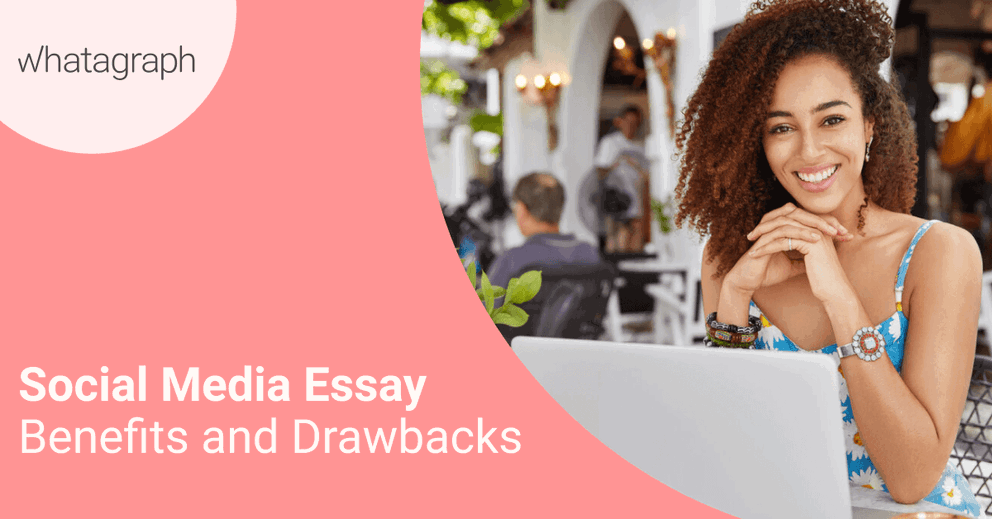
Table of Contents
What is social media essay, how do you write a social media essay, structure of social media essay, various tones of a social media essay, incorporate an attractive topic.
As you know, an social media essay is a piece of writing that is used to introduce an essential topic to the world with its underlying advantages and disadvantages. These aspects are driven solely by facts and should not contain the opinions of the writers. It is drafted to give others a better understanding of the subject in hand.
No matter which subject it pertains to, an essay ends with a conclusion where the writers are permitted to give their opinion after weighing the advantages and disadvantages.
Similarly, a social media essay is written to appreciate the positive aspects and highlight the negative impacts of social media in this time and day. The conclusions include the analysis of the two elements by the writers in their own lives and give an open-ended point of view. Depending upon the essay writer or paper writing service , the decision can be decisive, too, but that is not encouraged.
Today, the use of social networks, whether it is Facebook, Twitter, Snapchat, Instagram, or LinkedIn, has increased exponentially. An average millennial spends 2 hours and 58 minutes per day on social media platforms like Facebook. While some say that the platform is super-informative, others argue that all the information gathered on this platform is trivial and doesn't justify long hours invested in the use of social media.
The above arguments make using social media by individuals with a debatable issue, and this is why a lot of students are required to write an essay on social media. So, here are some incredible tips to help you out in writing an essay on social media even if you don't have marketing skills .
A classic essay consists of 3 parts – the introduction, main body, and the conclusion.
- The Introduction
As you introduce the main topic, always begin with how it is relevant to the current scenario. You can do this by providing some background information. The information can be made richer by adding some reliable stats and data . Once you have established the topic, you need to give a strong thesis statement of the hypothesis on which your essay is based.
The thesis statement in your essay should be precise and debatable. If not, the arguments that you are going to put forward in the essay would make no sense.
The main body of your text should consist of logical arguments in relevance to your hypothesis. Make sure you put forward one statement in one paragraph and start a new one with another section. This will make your essay look more organized.
Also, when developing ideas, only include the ones you can write clearly about. If not, avoid them. Make sure that the essay develops coherently.
To conclude the essay about social media, bring back your hypothesis, and state how the aspects you discussed earlier support or nullify it. Make it a point to summarize all ideas, but do not start adding more ideas when you are about to conclude. You can now give an, ideally, open end to your essay.
A great conclusion is the one that provokes thought and will make your readers question the use of social media in their everyday lives.
Also, remember that essays do not have to include pros and cons always. They can either be full of pros or cons or both, depending upon your hypothesis. Just ensure they are relevant.
You might believe that an essay is an essay, and two of them would be similar, but that's a misconception. Different essays have varying tones depending on how the author is treating the thesis statement through the main body of the text. Here are a few examples of essays on social media in different tones.
- Sample of a Persuasive Essay
If you are asked to write an academic paper about the effects of social media on the mental health of teenagers and young adults, you should make it persuasive. For this, just writing about the topic is not enough. It would help if you had an impactful thesis, followed by powerful arguments to support or question your theory.
The perils associated with social media addiction are forcing parents and "grown-ups" to throw their benefits in bad light today. In the race to become best in academics and non-academic activities, people are losing their grip on how social networks bring people together. They empower individuals with knowledge about various cultures and languages, which might not have been possible otherwise.
Social media sites can be addictive, and students might waste their formative years scrolling through the trivial feed and gain nothing but superficial knowledge. But that is just because neither parents nor the school is encouraging positive social media behavior. If these institutions start offering tips to students to limit and utilize their time on social media , one would be amazed to see their achievements.
Is social media a catalyst for the downfall of student life? Well, social media sites like Facebook, YouTube, Twitter, Instagram, and more are teeming with inspirational achievers and content creators who go the extra mile to share their stories and inspire students. If the children are taught to see their access to social media as an opportunity to grow rather than a competition for likes and followers, they are bound to work harder and achieve goals that seemed insurmountable earlier.
- Sample of Negative Essay about social media
If you have been asked to highlight the negative aspects of social media, your teacher does not mean that you have to cross all limits to present the use of social media in a bad light. Instead, what they are asking for is some logical and believable arguments that tell us why social media is harmful to society.
Social media is destroying family links by creating a virtual shell for each individual, which dissociates them with their own parents and siblings. The kids are adversely affected by increased access to social media if parents are always indulged in their devices and ignore them. Eventually, even kids start using tools to connect to other people, ignoring their family members.
Since kids and teenagers are the most impressionable age groups, they start believing that everything that glitters on social media platforms is gold, and they become materialistic. Their lives start revolving around likes, comments, and followers/subscribers. No matter whether their minds are prepared for such exposure or not, social media exposes them to the best and the worst about this world, which might turn them into rebels. They start valuing their online friends more than their offline lives and go to unimaginable extents to keep them entertained.
So, parents and elders need to pay attention to their children and limit their social media use so that they can learn to form real relationships and values.
- Weighing the pros and cons
Another way in which you can present your social media essay is by comparing the positive and negative aspects associated with it. In such essays, the conclusion is better left open for the readers to decide their own take on social media.
One cannot argue that social media has taken the world by storm by allowing like-minded individuals to connect and share their experiences with the world. You can use these platforms to make new friends and discover the ones who have lost touch. You can talk to everyone on your friend list and share your content on these channels to become a part of the creators' community. There is no dearth for talent on social media and its admirers.
On the other hand, if you use social media sites for long stretches of time in one go, you run the risk of addiction. Gradually, a social media addict starts to build a cocoon for themselves, which they find hard to step out of. This leads to a disconnect between you and the family you already have and love. One might feel too confined yet comfortable in their space that they have no urge left to step out, pushing them towards social seclusion, or worse – depression.
When you flip the coin again, you will discover that social media has become an incredible platform for small businesses to grow and earn good profits . The grass-root companies do not have to invest much for advertising and promotion or even own an establishment. All they have to do is to create a grassroots marketing strategy for themselves, and their brand will start selling in no time!
In the end, social media is a game-changer on the World Wide Web. It allows people to connect with the virtual world with the risk of disconnecting with the real world. Then again, businesses are doing well on these platforms. There are indeed two sides to social media, one positive and another negative, and it is up to you which one you lean towards more.
- Argumentative social media essay
A challenging but equally exciting type of essay on social media you should know about is an argumentative essay. It is often written when you are tasked with altering the point of view of the reader, which is of a completely opposite belief. Here is a sample for your better understanding.
Social networks have an uncertain future with the string impression they leave on users, especially the younger generations. Parents panic with the first mention of social media sites by their children and learning about their presence on these platforms because they are afraid of cyberbullying. They do not want their children to get cat-fished by some stranger on Reddit when they are not around.
Moreover, social media platforms are the reason why several individuals are losing their confidential data every day to corporate houses. These businesses are using the information to bug users with ads about stuff they do not want to buy.
If such instances carry on, the day is not far when the government will start to keep checks on the likes of Twitter, Facebook, Instagram, and other channels. Massive surveillance will be imposed on these sites to prevent malicious minds from harming innocent teenagers physically or by hacking into their systems. So, before you get a chance to ask " have I been hacked ", know that someone is taking care of it.
Having an attractive topic for your social media essay does not mean using poetic words in it. You should have an issue relevant to the current scenario. In the process of selecting a fascinating topic, do not forget to keep it within the extents of your knowledge. If it becomes too complicated for you to write about, you will be stuck when coming up with arguments and ideas.
The perfect topic would be the one which offers good potential for research and is interesting for the readers too. Even if you present profound arguments about such topics, they should be in a logical, comprehensible, and readable format for people to understand easily.
Writing a social media essay is no cakewalk, whether you are a high-school student or university student. All you need to do is, structuralize it properly, be clear with the ideas and arguments you are planning to present, pick the tone of your essay, and began writing. Do not forget to top your essay up with a catchy topic so that your entire hard work doesn't fall flat.
Published on Sep 03 2020
Gintaras is an experienced marketing professional who is always eager to explore the most up-to-date issues in data marketing. Having worked as an SEO manager at several companies, he's a valuable addition to the Whatagraph writers' pool.

Related articles

Marketing analytics & reporting · 12 mins
19 Best Social Media Analytics Tools for Marketers in 2024
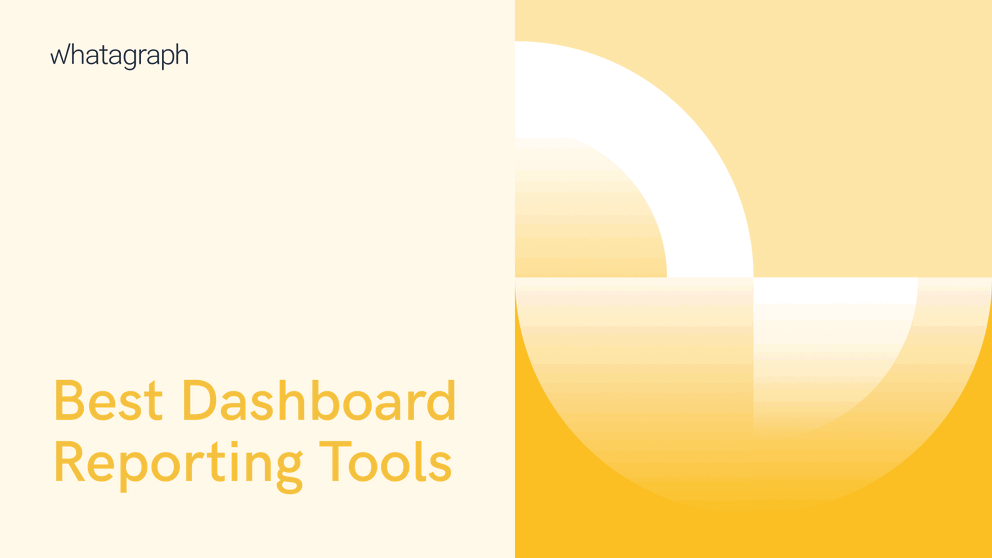
Marketing analytics & reporting · 10 mins
12 Best Dashboard Reporting Tools and Software for Marketers in 2024

14 Best Facebook Analytics Tools for Marketers in 2024

12 Best White Label Marketing Tools for Agencies in 2024

Agency guides · 10 mins
How to Build a Client Dashboard: An Ultimate Guide for Agencies

Best Funnel.io Alternatives for Marketers in 2024
Get marketing insights direct to your inbox.
By submitting this form, you agree to our privacy policy

Social Media Essay: A Comprehensive Guide
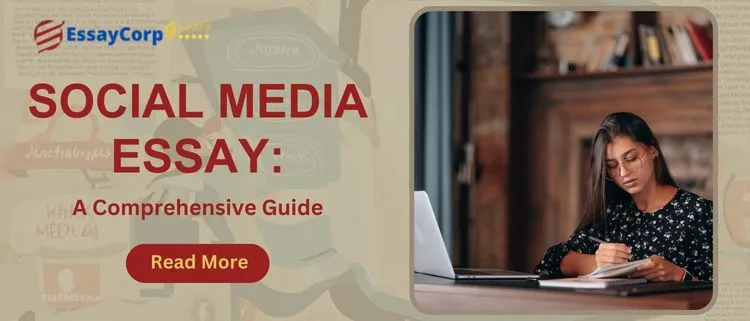
- Emily Scott
In an age when one tweet can start a global conversation and an Instagram picture may change trends, it's amazing to realize that the typical person spends about 2 hours and 31 minutes every day on social media sites. That's more than 900 hours a year spent scrolling, enjoying, and sharing in the huge digital world. As we grow more enmeshed in the fabric of online communities, the need of understanding and communicating the dynamics of social media through the written word, particularly in a social media essay, becomes clearer. So, why begin on the adventure of writing an essay about this common feature of modern life?
Social Media Essay Introduction
In this post, we'll look at how to write an essay on social media and why these narratives exist, as well as a variety of other interesting topics. From the heartbeat of internet relationships to the rhythm of good narrative, we'll walk you through the process, giving tips on structure, technique, and the creative soul that distinguishes each essay. And whether you're seeking assistance or wondering
Why Write a Social Media Essay
In a world filled with hashtags, filters, and the continual hum of notifications, sitting down to write an essay about social media may appear as out of place as a cassette tape in a streaming era. However, there's something strangely cathartic, almost rebellious, about pausing in the midst of 280-character wisdom to delve deeper into the why of our digital existence.
So, what exactly is a social media essay, and why would you write one? It's more than just a test of intellectual curiosity. It's a personal trip, a meditative break in the never-ending scroll. While writing the essay, we get the ability to articulate the intangible, to give life to the pixels that dance across our screens. It's an opportunity to make sense of the chaos, find meaning in the memes, and, perhaps, learn a little more about ourselves in this digital wilderness.
Let's be honest: our online lives revolve around memes, viral challenges, and meticulously edited selfies. So, why bother wrestling with words and paragraphs in a world when brevity reigns supreme? The solution lies in the art of unraveling the digital fabric that surrounds us.
There's something magical in articulating the dance between the sublime and the banal that happens within the limits of our screens. An article serves as a lens, focusing our attention on the nuances of social media dynamics, such as internal jokes that become global phenomena, the ripple effect of a well-timed retweet, and the quiet conversations that occur in the comment sections.
6 Key Tips for Writing a Social Media Essay
Now that we've embarked on a journey of writing essays about the digital landscape, it's only fair to arm ourselves with a few reliable tools. Consider these guidelines to be your compass, guiding you through the sometimes turbulent, often unforeseen waters of writing a social media essay.
Define your angle : Choose a specific aspect of social media to focus on. Will you explore its impact on education, mental health, political discourse, or something else entirely? Having a clear angle will guide your research and make your essay more cohesive.
Research like a pro : Don't just rely on personal anecdotes or opinions. Dig into academic journals, credible news sources, and relevant statistics to support your arguments. Consider interviewing experts or everyday users of social media to gain diverse perspectives.
Strike a balance : Acknowledge both the positive and negative impacts of social media. Avoid portraying it as a simple "good" or "bad" phenomenon. Show your critical thinking skills by presenting a nuanced discussion of its complexities.
Engage your audience : Use vivid language, relatable examples, and even humor (if appropriate) to keep your reader hooked. Remember, you're competing with the constant distractions of social media itself, so make your essay engaging and thought-provoking.
Support your claims : Every point you make should be backed up with evidence. This could include factual data, quotes from experts, or personal stories that illustrate your arguments. Use relevant and credible sources to strengthen your essay's credibility.
Conclude with a bang : Don't just summarize your points. Offer a thoughtful conclusion that ties everything together and leaves your reader with something to ponder. Perhaps propose solutions to identified problems or suggest areas for further research.

Social Media Essay Topics
In the huge world of social media, where every like and share adds to the digital story, selecting the proper social media essay titles and topics becomes an important compass for inquiry. Let's look at thought-provoking themes that will not only hold your interest but also spark thoughtful discussions about the complexities of our linked world.
Individual & Identity:
The impact of social media on self-esteem and body image.
How social media shapes our sense of identity and belonging.
The rise of "fake personas" and the concept of online authenticity.
Social media and the pressure to conform to unrealistic beauty standards.
The impact of social media on mental health and anxiety.
Society & Culture:
The role of social media in spreading misinformation and propaganda.
The rise of "echo chambers" and political polarization.
How social media influences social movements and activism.
The influence of social media on conventional media and journalism.
The ethics of data gathering and privacy issues on social networking.
Business & Marketing:
The effectiveness of social media marketing for businesses and brands.
The development of influencer marketing and its effects on consumer behavior.
Social media advertising presents both obstacles and opportunity.
The ethical considerations of targeted advertising and data use.
The future of social media and its role in the global economy.
Specific Platforms:
The unique impact of specific platforms like Facebook, Instagram, Twitter, TikTok, etc.
The evolution of social media platforms and their changing features.
The impact of social media on specific demographics like teenagers, young adults, or seniors.
The ethical concerns and controversies surrounding specific platforms.
The future of specific platforms and their potential impact on society.
If these subjects sparked your attention, you'll probably find persuasive essay ideas to be just as fascinating! Dive into our post to discover a selection of possibilities that can catch your interest and inspire your next writing project.
Wrapping Up
As our university essay writing service professionals wrap up this post, we've explored the emotional intricacies, societal reflections, and transformative potentials buried in our digital narratives. An article on social media offers a glimpse into the delicate dance of our online lives, encouraging introspection, empathy, and knowledge of other stories. Allow your articles to honestly reflect, sparking discussions that deepen our collective experience in this ever-changing digital universe.
Book Your Assignment
For your response..
We will revert back soon!! Your information is 100% safe with us.
Recent Posts
The Importance of Conceptualization While Conducting Social Research
218 anatomy & physiology topics to research, understanding and supporting children with childhood trauma, australia doubles foreign student visa fees: how it affects indians, how to write a rhetorical analysis essay.
- Academic (29)
- Accounting (25)
- Assignments (83)
- Biochemistry (1)
- Business (8)
- Business Law (2)
- Case Study (4)
- Celebration (22)
- Communication (1)
- Computer Network (2)
- Computer Science (19)
- Coursework Help (1)
- Cybersecurity (1)
- Dissertation (13)
- Economics (18)
- Engineering (21)
- English (5)
- Essay Writing (51)
- Events (34)
- Finance (12)
- Holmes Institute (1)
- Homework (6)
- International Students (2)
- Leadership (1)
- Lifestyle (8)
- Management (39)
- Marketing (14)
- Mass Communication (2)
- Mathematics (9)
- Medical (8)
- Miscellaneous (21)
- News and Information (23)
- Nursing (14)
- Perdisco (2)
- Programming (18)
- Proofreading Services (1)
- Science (19)
- Social Science (5)
- Statistics (3)
- Study Abroad (6)
- Taxation (2)

Essay on Pros and Cons of Social Media
Students are often asked to write an essay on Pros and Cons of Social Media in their schools and colleges. And if you’re also looking for the same, we have created 100-word, 250-word, and 500-word essays on the topic.
Let’s take a look…
100 Words Essay on Pros and Cons of Social Media
Introduction.
Social media is a powerful tool used by people worldwide. It has both pros and cons that we will discuss.
Pros of Social Media
Social media allows us to connect with friends and family, share ideas, and learn new things. It’s a great way to stay informed and engaged.
Cons of Social Media
However, it can also lead to cyberbullying, misinformation, and addiction. It can negatively impact mental health and productivity.
It’s important to use social media responsibly, balancing the benefits and drawbacks, to ensure a positive experience.
250 Words Essay on Pros and Cons of Social Media
One of the primary benefits of social media is its ability to foster connectivity. It enables individuals to stay in touch with friends and family across the globe, breaking geographic boundaries. Moreover, it serves as a platform for information dissemination and awareness, playing a crucial role in movements like #BlackLivesMatter and #MeToo.
Social media also facilitates learning and professional growth. Platforms like LinkedIn, for instance, enable networking and job hunting, while academic forums provide resources for students and researchers.
Despite its benefits, social media has its share of drawbacks. It can lead to an excessive focus on virtual interactions at the expense of real-life relationships. This over-reliance often results in feelings of loneliness and social isolation.
Additionally, the spread of misinformation is a significant concern. Fake news can propagate rapidly, leading to harmful consequences, as seen during the COVID-19 pandemic.
In conclusion, while social media provides a platform for connectivity and learning, it also poses risks like social isolation and misinformation. It’s essential to use these platforms judiciously, understanding their potential pitfalls.
500 Words Essay on Pros and Cons of Social Media
The pros of social media.
Social media has democratized the dissemination of information, making it more accessible than ever. It has become a platform where people can voice their opinions, rally for causes, and effect social change. The Arab Spring is an example of how social media can be used to mobilize and coordinate mass protests.
Another advantage is the connectivity it offers. Social media platforms allow people to stay in touch with friends and family across the globe. It fosters a sense of community and enables the sharing of experiences, ideas, and emotions.
In the business world, social media is a powerful marketing tool. It allows businesses to engage with their customers, gather feedback, and improve their products or services based on consumer preferences.
The Cons of Social Media
Despite its many advantages, social media has its downsides. One of the major concerns is privacy. The vast amount of personal data shared on these platforms can be exploited by malicious entities for identity theft, cyberstalking, or other harmful activities.
The impact on mental health is another significant concern. Excessive use of social media can lead to addiction, decreased productivity, and feelings of inadequacy due to the comparison with others’ lives. Studies have linked heavy social media use to depression, anxiety, and low self-esteem.
Moreover, social media can promote echo chambers, where people are exposed only to views similar to their own, leading to polarization and intolerance.
In conclusion, social media is a double-edged sword. On one hand, it democratizes information, fosters global connectivity, aids in learning, and serves as a powerful tool for businesses. On the other hand, it poses significant privacy risks, facilitates the spread of misinformation, can negatively impact mental health, and contribute to societal polarization. As users, we must navigate this digital landscape with caution, leveraging its benefits while being vigilant of its drawbacks.
If you’re looking for more, here are essays on other interesting topics:
Apart from these, you can look at all the essays by clicking here .
Leave a Reply Cancel reply
Save my name, email, and website in this browser for the next time I comment.


The rise of social media
Social media sites are used by more than two-thirds of internet users. how has social media grown over time.
This article is an archived version of an article published in 2019. Due to data availability, the article and charts will not be updated.
Facebook, the largest social media platform in the world, had 2.4 billion users in 2019. Other social media platforms, including YouTube and WhatsApp, also had over one billion users each.
These numbers are huge – in 2019, there were 7.7 billion people worldwide, with at least 3.5 billion online . This means social media platforms were used by one in three people worldwide and more than two-thirds of all Internet users.
Social media has changed the world. The rapid and vast adoption of these technologies is changing how we find partners , access information from the news, and organize to demand political change .
Who uses social media? When did the rise of social media start, and how has the number of users changed over time? Here we answer these and other key questions to understand the history of social media worldwide.
We begin with an outline of key trends and conclude with a perspective on the social media adoption rate relative to other modern communication technologies.
Social media started in the early 2000s
MySpace was the first social media site to reach a million monthly active users – it achieved this milestone around 2004. This is arguably the beginning of social media as we know it. 1
In the chart, we plot monthly active users across various platforms since 2004.
Some large social media sites, such as Facebook, YouTube, and Reddit, have been around for ten or more years, but others are much newer.
TikTok, for example, launched in September 2016, and by mid-2018, it had already reached half a billion users. To put this in perspective: TikTok gained, on average, about 20 million new users per month over this period.
The data also shows rapid changes in the opposite direction. Once-dominant platforms have disappeared. In 2008, Hi5, MySpace, and Friendster were close competitors to Facebook, yet by 2012 they had virtually no market share. The case of MySpace is remarkable, considering that in 2006 it temporarily surpassed Google as the most visited website in the US.
Most social media platforms that survived the last decade have shifted significantly in what they offer users. Twitter, for example, didn’t allow users to upload videos or images initially. Since 2011 this has been possible, and today, more than 50% of the content viewed on Twitter includes images and videos.
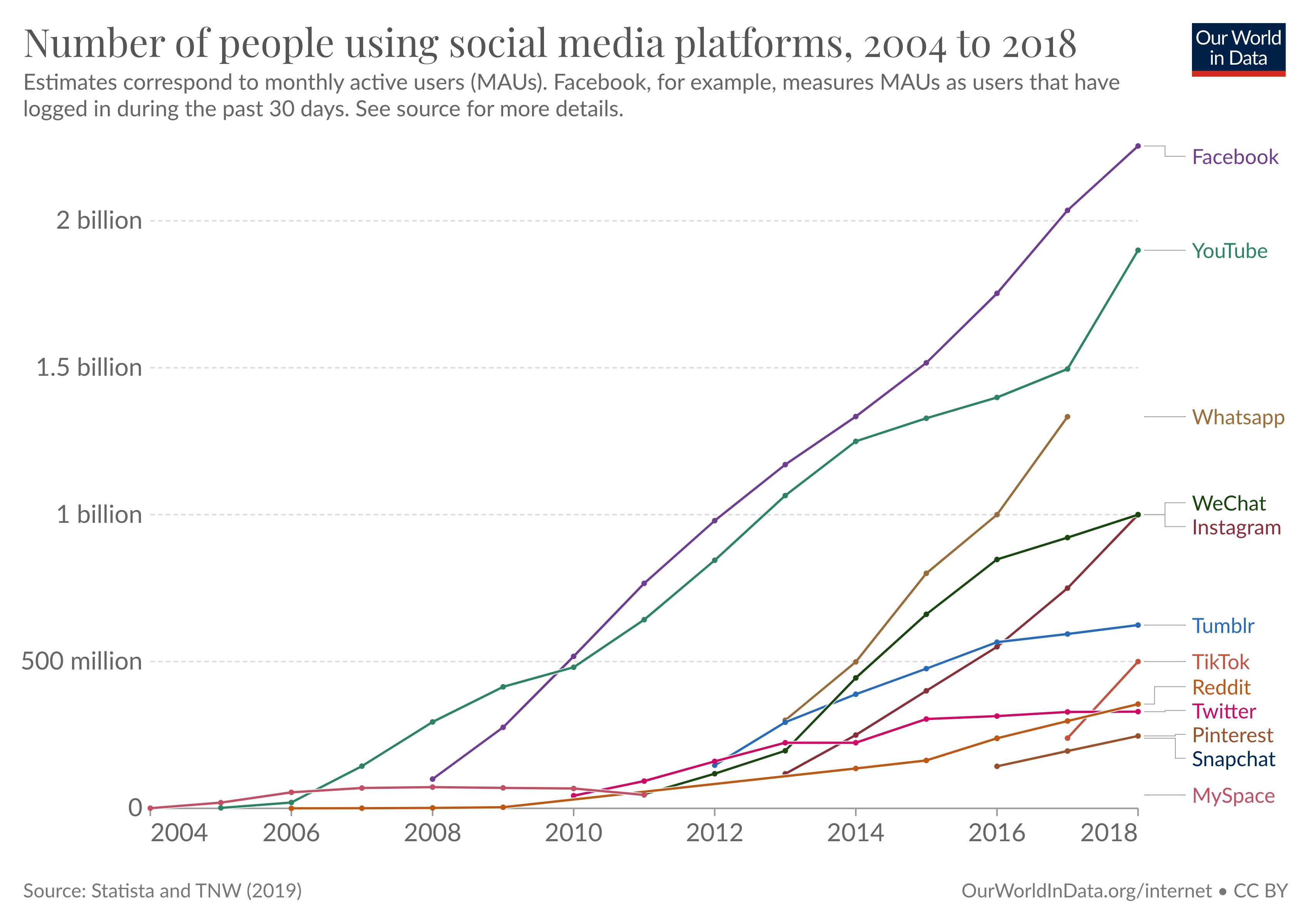
Facebook dominated the social media market for a decade, but five other platforms also have more than half a billion users
With 2.3 billion users, Facebook was the most popular social media platform in 2019. YouTube, Instagram, and WeChat followed, with over a billion users. Tumblr and TikTok came next, with over half a billion users.
The bar chart shows a ranking of the top social media platforms.
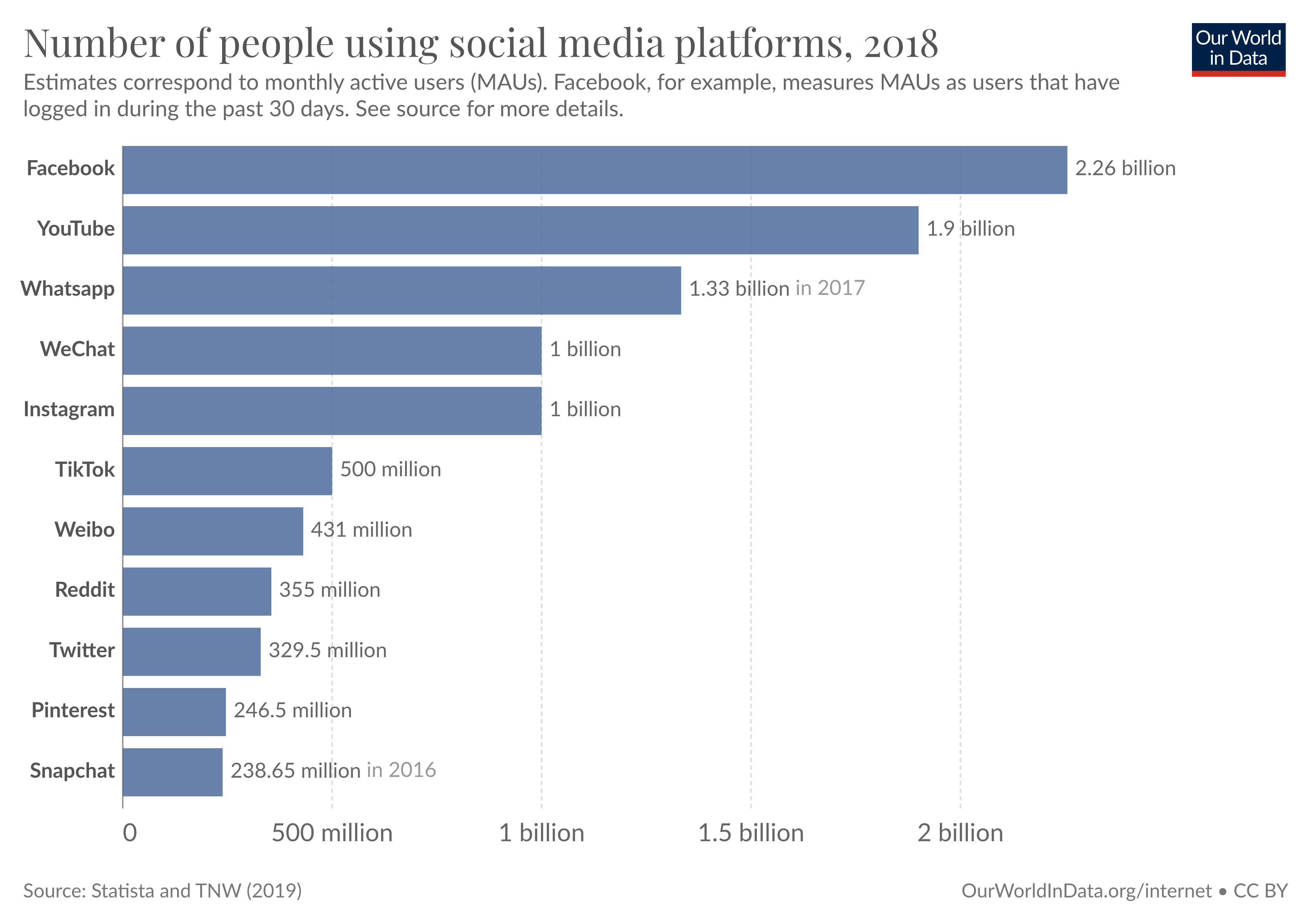
Some social media sites are particularly popular among specific population groups
The aggregate numbers mask a great deal of heterogeneity across platforms. Some social media sites are much more popular than others among specific population groups.
In general, young people are more likely to use social media than older people. But some platforms are much more popular among younger people. This is shown in the chart where we plot the breakdown of social media use by age group in the US.
For Snapchat and Instagram, the ‘age gradient’ is exceptionally steep – the popularity of these platforms drops much faster with age. Most people under 25 use Snapchat (73%), while only 3% of people over 65 use it.
Since these platforms are relatively new, it’s hard to know how much of this age gradient results from a “cohort effect”. In other words: it’s unclear whether today’s young people will continue using Snapchat as they age. If they do, the age gradient will narrow.
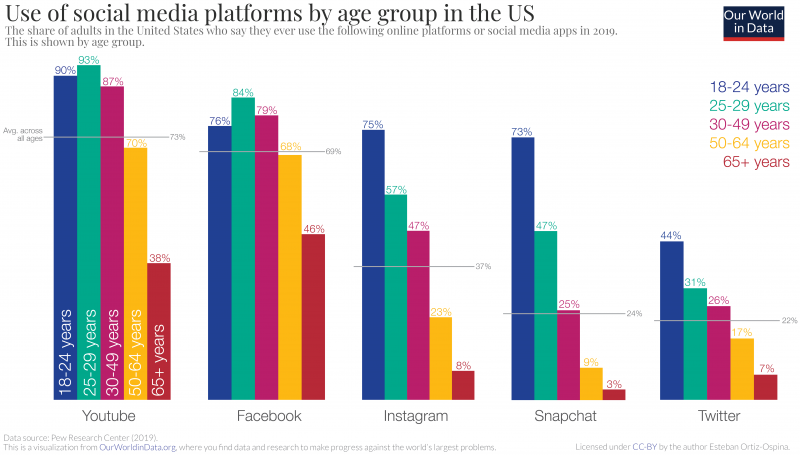
Let’s now look at gender differences.
This chart shows the percentage of men and women that used different platforms in the US in 2021—the diagonal line marks parity. Sites above the diagonal line are more popular among women, and those below are more popular among men.
For some platforms, the gender differences are substantial. The share of women who used Pinterest was 3 times as high as that of men using this platform. For Reddit, it was the other way around: the share of men was twice as high.
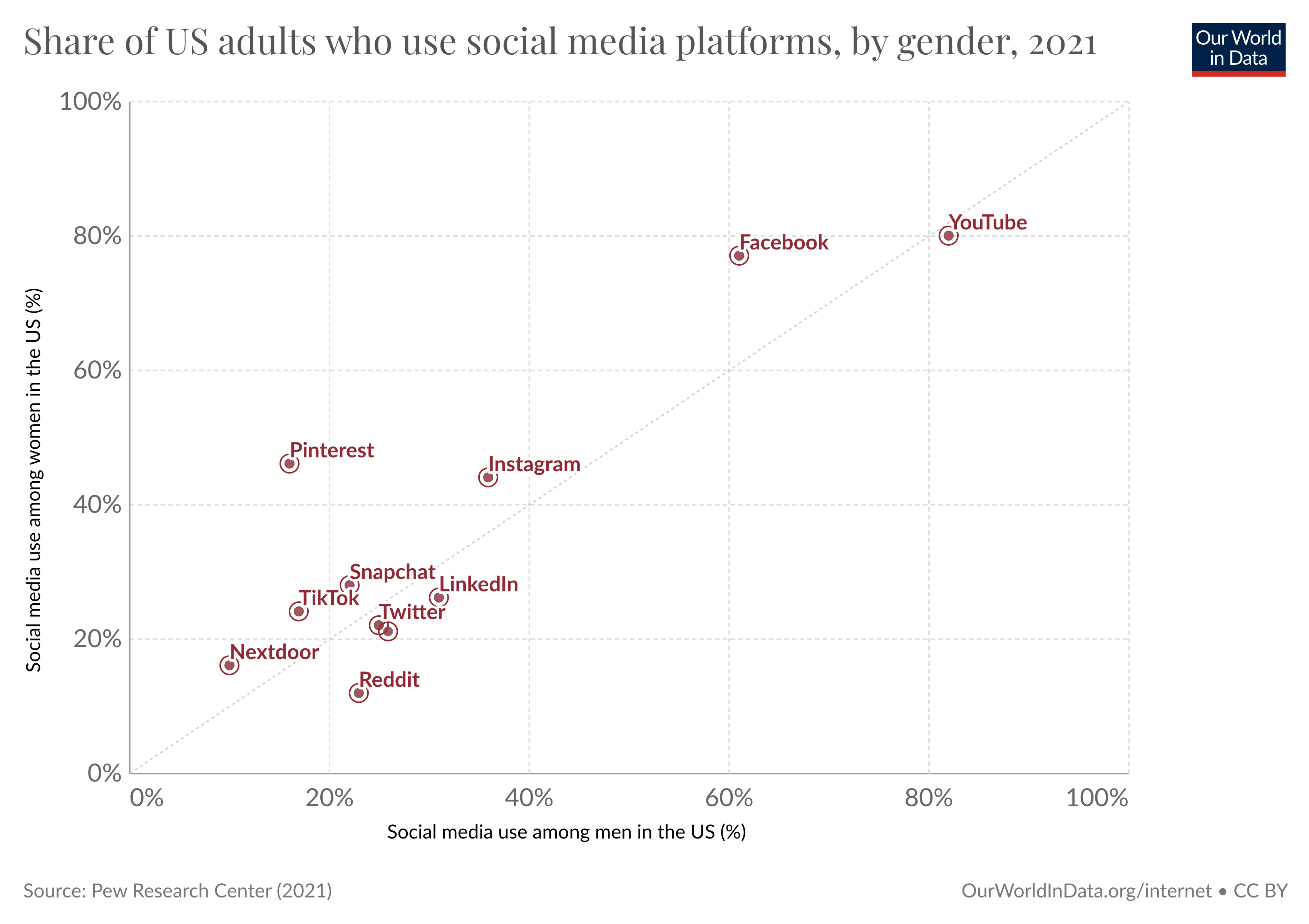
In rich countries, almost all young people use social media
From a back-of-the-envelope calculation, we know that if Facebook had 2.3 billion users in 2019, then at least 30% of the world was using social media. 2 This is just an average – usage rates were much higher for some world regions, specifically for some population groups.
Young people tend to use social media more frequently. In fact, in rich countries where access to the Internet is nearly universal , the vast majority of young adults use it.
Our chart shows the proportion of people aged 16 to 24 who used social networks across various countries. As we can see, the average for the OECD is close to 90%.
If today’s young adults continue using social media throughout their lives, then it’s likely that social media will continue growing rapidly as Internet adoption expands throughout lower-income countries .
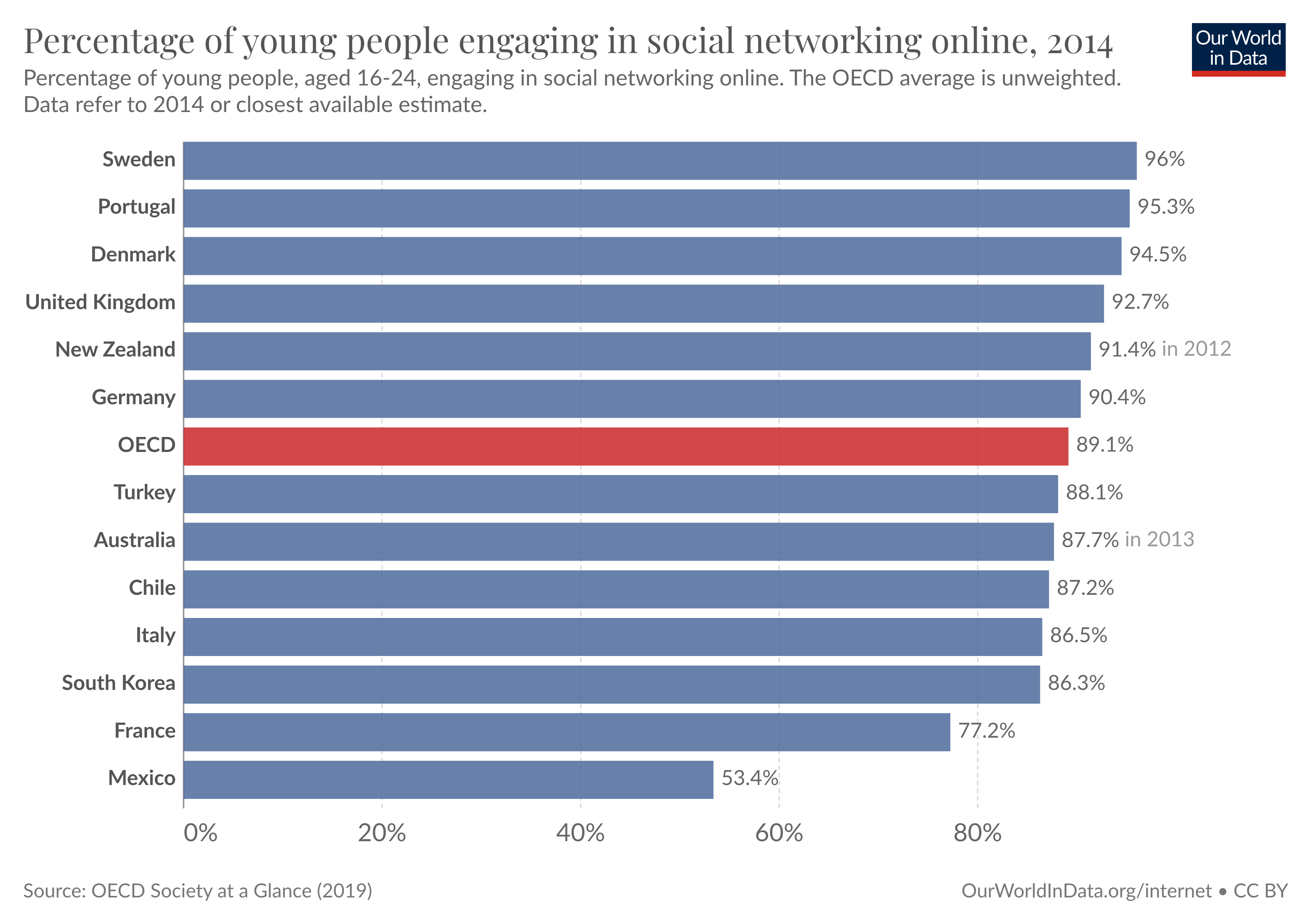
The rise of social media in rich countries has come together with an increase in the amount of time spent online
The increase in social media use over the last decade has, of course, come together with a large increase in the amount of time people spend online.
In the US, adults spend more than 6 hours daily on digital media (apps and websites accessed through mobile phones, tablets, computers, and other connected devices such as game consoles). As the chart shows, this growth has been driven almost entirely by additional time spent on smartphones and tablets. 3
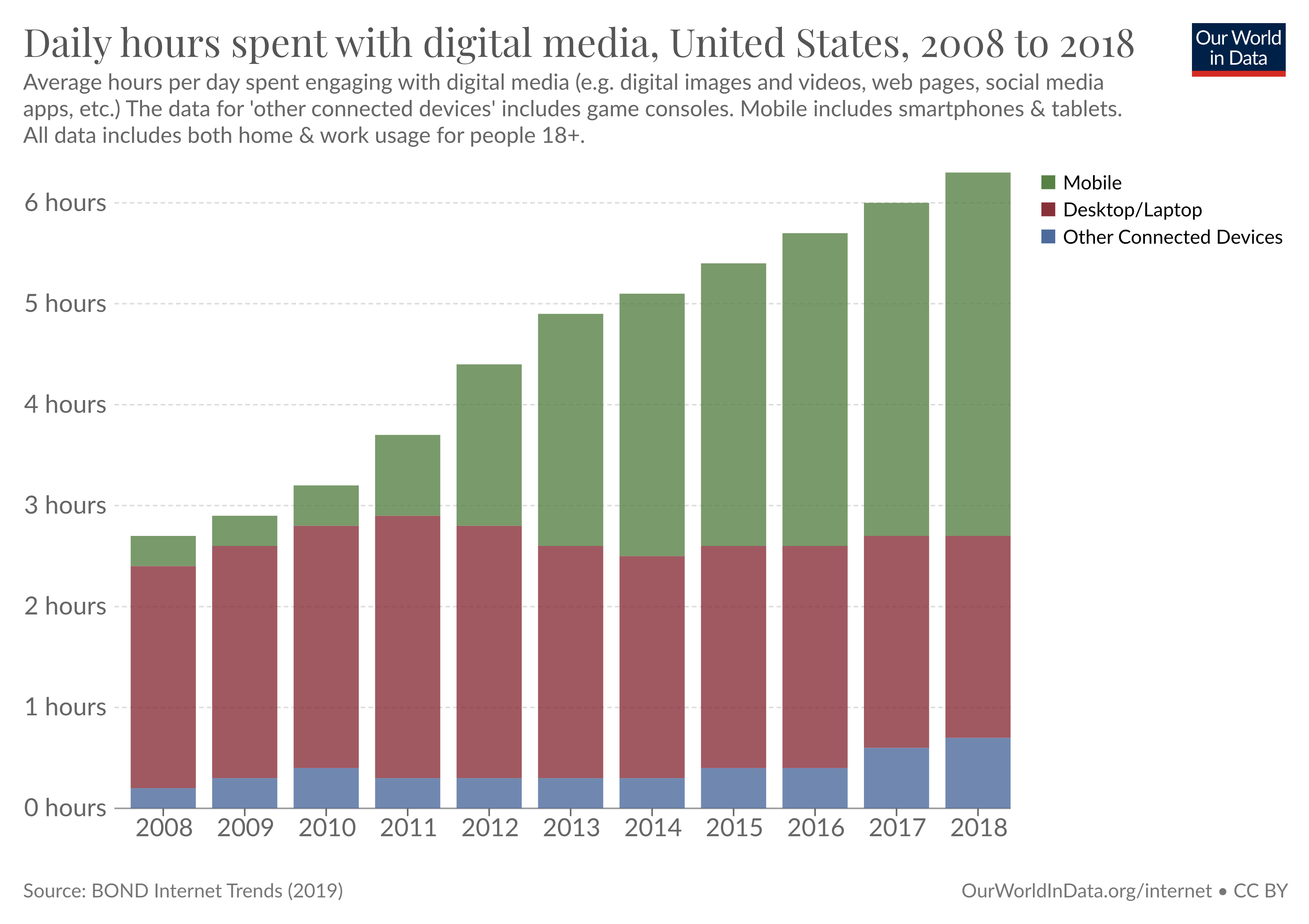
According to a survey from the Pew Research Center, adults aged 18 to 29 in the US are more likely to get news indirectly via social media than directly from print newspapers or news sites. They also report being online “almost constantly” . 4
Evidence shows that in other rich countries, people also spend many hours per day online. The following chart shows how many hours young people spend online across various rich countries. As we can see, the average for the OECD is more than 4 hours per day; in some countries, the average is above 6 hours per day.
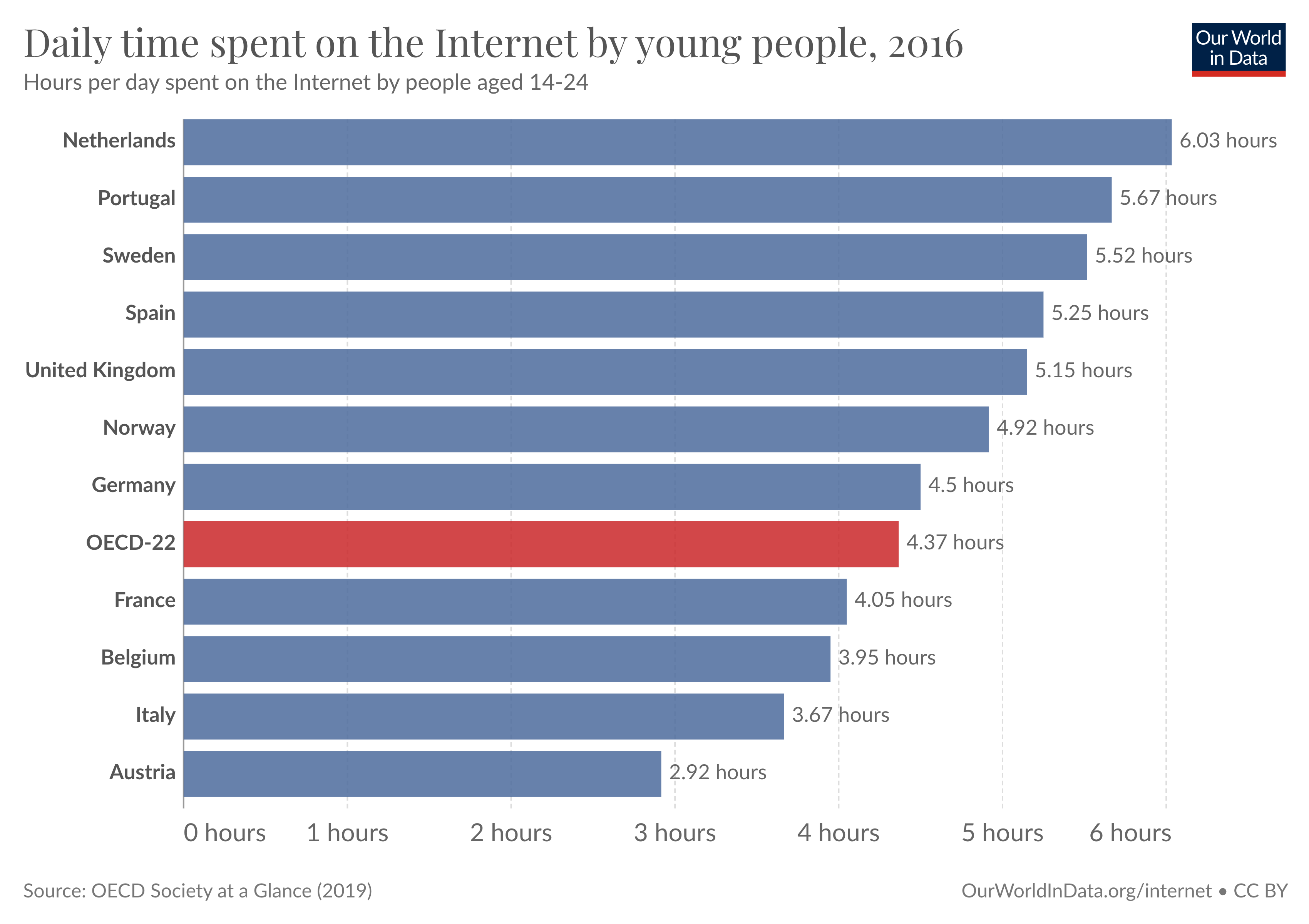
Some perspective on how fast and profound these rapid changes are
The percentage of US adults who use social media increased from 5% in 2005 to 79% in 2019. Even on a global stage, the speed of diffusion is striking: Facebook surged from covering around 1.5% of the world population in 2008 to around 30% in 2018. 5
How does this compare to the diffusion of other communication technologies in today's everyday life?
The following chart provides some perspective.
Social media’s growth in the US is comparable – in speed and, to some extent, reach – to most modern communication-enabling technologies, including computers, smartphones, and the Internet.
The rise of social media is an extraordinary example of how quickly and drastically social behaviors can change: Something that is today part of the everyday life of one-third of the world population was unthinkable less than a generation ago.
Rapid changes like those brought about by social media always spark fears about possible negative effects. Specifically, in the context of social media, a key question is whether these new communication technologies are harming our mental health – this is an important question and we cover the evidence in another article on Our World in Data.
There were, of course, earlier, much smaller predecessors of social networking websites. The first recognizable social media site, in the format we know today, was Six Degrees – a platform created in 1997 that enabled users to upload a profile and make friends with other users. At the core, the features that define a social media platform are (i) profiles for users, (ii) the ability for users to upload content constantly, and (iii) the ability for users to discuss content and connect with other users.
To be precise, Facebook had 2.3 billion ‘active users.’ There may be some discrepancies between the number of ‘active users’ and the number of people since one person could, in theory, maintain multiple accounts. In practice, these discrepancies are likely small because most social media platforms, including Facebook, have policies and checks to avoid multiple accounts per person.
Digital media contrasts with print media (including books, newspapers, and magazines) and other traditional or analog media (including TV, movies, and radio).
According to the survey from Pew Research, 36% of adults 18 to 29 in the US say they ‘often get news via social media,’ which is higher than the share saying they ‘often get news via other platforms,’ such as news sites, TV, radio or print newspapers. From the same survey, we also know that 48% of adults 18 to 29 say they go online almost constantly, and 46% say they go online multiple times daily.
The US social media adoption data is here . Regarding Facebook’s global numbers: In 2018, Facebook had 2.26 billion users, and in 2008 it had 100 million; the world population in 2008 was 6.8 billion, and in 2018 it was 7.63 billion (you can check the population data here .)
Cite this work
Our articles and data visualizations rely on work from many different people and organizations. When citing this article, please also cite the underlying data sources. This article can be cited as:
BibTeX citation
Reuse this work freely
All visualizations, data, and code produced by Our World in Data are completely open access under the Creative Commons BY license . You have the permission to use, distribute, and reproduce these in any medium, provided the source and authors are credited.
The data produced by third parties and made available by Our World in Data is subject to the license terms from the original third-party authors. We will always indicate the original source of the data in our documentation, so you should always check the license of any such third-party data before use and redistribution.
All of our charts can be embedded in any site.
Our World in Data is free and accessible for everyone.
Help us do this work by making a donation.
Home / Essay Samples / Entertainment / Social Media
Social Media Essay Examples
Social media has become an integral part of modern society, impacting communication, culture, and various aspects of daily life. An essay example focused on social media serves a crucial purpose in exploring the effects, implications, and nuances of this digital phenomenon. It provides readers with a tangible illustration of how social media influences behavior, relationships, and society as a whole. One of the primary goals of essays on social media is to analyze trends, patterns, and behaviors that emerge within online platforms. These essays can delve into how individuals interact, share information, and form communities in the digital realm. By examining these behaviors, readers gain insights into the evolving nature of communication.
Exploration of Impact on Relationships Social media’s impact on relationships, both personal and professional, is a significant topic of discussion. Essay examples can explore how social media influences interpersonal connections, intimacy, and the dynamics of friendships, family relationships, and romantic partnerships. Essays on social media often address privacy concerns and ethical considerations. These essays can analyze how personal data is collected, shared, and monetized on social platforms. Discussions about the ethical use of data and the potential for exploitation are crucial in the age of digital information. Writing Tips for Social Media Essays:
Focus on a Specific Aspect: Choose a specific angle or aspect of social media to explore in your essay, whether it’s a particular platform, a trend, or an impact. Thesis Statement: Start with a clear thesis that outlines your main argument or perspective on the topic. Evidence-Based: Support your arguments with relevant data, statistics, case studies, and real-life examples. Critical Analysis: Engage in critical analysis of the positive and negative effects of social media, considering both sides of the argument. Cohesion and Structure: Organize your essay logically, with an introduction, body paragraphs, and conclusion. Ensure that your ideas flow smoothly and cohesively. Ethical Considerations: Discuss ethical concerns related to social media use, such as privacy, online harassment, and the spread of misinformation. Future Implications: Consider the potential future developments and impacts of social media in your essay.
A social media essay example serves as a means to dissect the intricate relationship between technology, communication, and society. By studying and analyzing these examples, readers can gain insights into the multifaceted effects of social media, the complexities of online interactions, and the potential ramifications for individuals and communities.
About Modern Communication: How Social Media Change Life
It’s hard to imagine the world without social media in todays world. We use it for a variety of by keeping in touch with friends and family, promote ourselves, express our thoughts and opinions to the world, connect with people who are abroad, keep up...
Social Media is Making Us Less Social
In an era dominated by digital communication, the impact of social media on our social interactions is a topic of heated debate. While proponents argue that social media enhances connectivity, evidence suggests that it is, in fact, making us less social. This essay presents an...
Effects of Social Media on Communication Skills: Its Ups and Downs
Overtime digital communication has had a major impact on the community building in America both positive and negative. Today social media has created a platform for everyone to share their personal opinions and ideas in a more simple and direct way and people now have...
Modern Necessity: Negative and Positive Effects of Social Media
The importance of social media is huge, it has become a necessary part of our daily lives and with this relevance comes advantages and disadvantages. Connectivity heedless of distance is one of the main positive effects of social media, however it can cause addiction and...
Why Social Media is Bad - Youth is Under the Risk
Technology advancements have been a blessing to human beings; and today, computers, and mobile devices have become a part of our daily lives. The internet is also a part of the technology that many of us have come to appreciate. Basically, in this day and age, it...
Evaluating the Impact of Social Media on Youth
Justifying an evaluation essay involves critically assessing a subject and providing valid reasons for the assessment. In this essay, we will delve into the impact of social media on youth, evaluating its influence on various aspects of their lives. By examining both the positive and...
The Influence of Social Media on Self-esteem
Social media has transformed the way we connect, communicate, and share our lives. While it offers numerous benefits, such as staying connected with friends and accessing information, its impact on self-esteem has come under scrutiny. This essay, focusing on the theme of "social media and...
Should Social Media Be Regulated: Its Impact on Political Decisions
There is no monocausal theory that can adequately explain the total explain of how social media changes and influences politics as it is divided onto a string of different and various platforms that are regulated in different ways, operating in different countries and having different...
Agree Or Disagree: Media Reduce Meaningful Interaction Between People
There is a statement that social media diminish meaningful interaction between their users. In the next paragraphs I will explaine to what extend do I agree or disagree with it; this essay will discuss if social media is making interactions between users less meaningful or...
Relationship Between Social Media and Depression
In today's interconnected world, social media platforms have become integral parts of our lives. These platforms offer a plethora of opportunities for communication, sharing, and self-expression. However, beneath the glossy façade of curated feeds and engaging content lies a darker reality – the potential link...
Trying to find an excellent essay sample but no results?
Don’t waste your time and get a professional writer to help!
You may also like
- Hotel Rwanda
- Movie Review
- Dance Performance Review Essays
- Acting Essays
- Citizen Kane Essays
- Film Analysis Essays
- The Blind Side Essays
- Fast Fashion Essays
- Boys and Girls Essays
- Voice Essays
- Anthem Essays
- Call of The Wild Essays
About Social Media
Facebook, YouTube, WhatsApp, Instagram, Twitter, WeChat, TikTok, LinkedIn, etc.
Six Degrees is widely considered to be the very first social networking site, founded by Andrew Weinreich in May 1996
Social media are interactive technologies that facilitate the creation and sharing of information, ideas, interests, and other forms of expression through virtual communities and networks.
Facebook, YouTube, WhatsApp, Instagram,Twitter, WeChat, TikTok, LinkedIn, etc.
Social media may take the form of a variety of tech-enabled activities: Social Networks (Facebook, Twitter, LinkedIn),Media Sharing Networks (Instagram, Snapchat, YouTube), Discussion Forums (Reddit, Quora, Digg),Bookmarking & Content Curation Networks (Pinterest, Flipboard),Consumer Review Networks (Yelp, Zomato, TripAdvisor), Blogging & Publishing Networks (WordPress, Tumblr, Medium),Social Shopping Networks (Polyvore, Etsy, Fancy), Interest-Based Networks(Goodreads, Houzz, Last.fm)
Social media is a big monster today. It’s a very large ocean with uncountable content, news and information. The average internet user has 8.6 social media accounts and every 6.4 seconds a new account has been created. Today in excess of 3.2 billion photos and 720,000 hours of video are shared per day across social media. 91% of retail brands use 2 or more social media channels.
samplius.com uses cookies to offer you the best service possible.By continuing we’ll assume you board with our cookie policy .--> -->